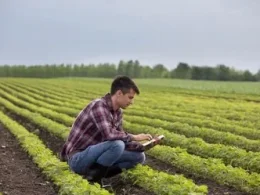As the European Union sets ambitious targets to reduce its carbon footprint, the agriculture sector is under scrutiny to meet its green farming ambitions. The EU has committed to reducing its greenhouse gas emissions by at least 55% by 2030, and agriculture is expected to play a crucial role in achieving this goal.
The EU’s green farming ambitions are centered around sustainable agriculture, which aims to reduce the environmental impact of farming practices while maintaining food security. This includes measures such as reducing synthetic fertilizers, promoting organic farming, and increasing the use of renewable energy sources.
However, the road to achieving these ambitions is not without its challenges. The EU’s agricultural sector is heavily reliant on fossil fuels, and the transition to renewable energy sources will require significant investment and infrastructure development.
The EU has set a target of reducing its greenhouse gas emissions from agriculture by 30% by 2030, and the agriculture sector is expected to play a crucial role in achieving this goal. To achieve this, the EU has implemented a range of policies and initiatives, including the Common Agricultural Policy (CAP), which provides financial support to farmers who adopt sustainable farming practices.
Despite these efforts, the EU’s agriculture sector still faces significant challenges in reducing its environmental impact. The sector is heavily reliant on synthetic fertilizers, which contribute to greenhouse gas emissions and water pollution. Additionally, the EU’s agricultural sector is also facing pressure from climate change, which is expected to impact crop yields and food security.
To overcome these challenges, the EU is investing in research and development of new technologies and practices that can help reduce the environmental impact of farming. This includes the development of precision agriculture, which uses advanced technologies such as drones and satellite imaging to optimize crop yields and reduce waste.
While the EU’s green farming ambitions are ambitious, they are achievable with the right policies and investments. The EU’s agriculture sector has the potential to play a crucial role in reducing the EU’s carbon footprint and achieving its climate goals.
The EU’s green farming ambitions are not just about reducing greenhouse gas emissions, but also about promoting sustainable agriculture and improving food security. The EU’s agriculture sector has the potential to be a leader in sustainable agriculture, and the EU’s green farming ambitions provide a framework for achieving this goal.
The EU’s green farming ambitions are a critical step towards achieving its climate goals, and the agriculture sector has a key role to play in reducing the EU’s carbon footprint.









